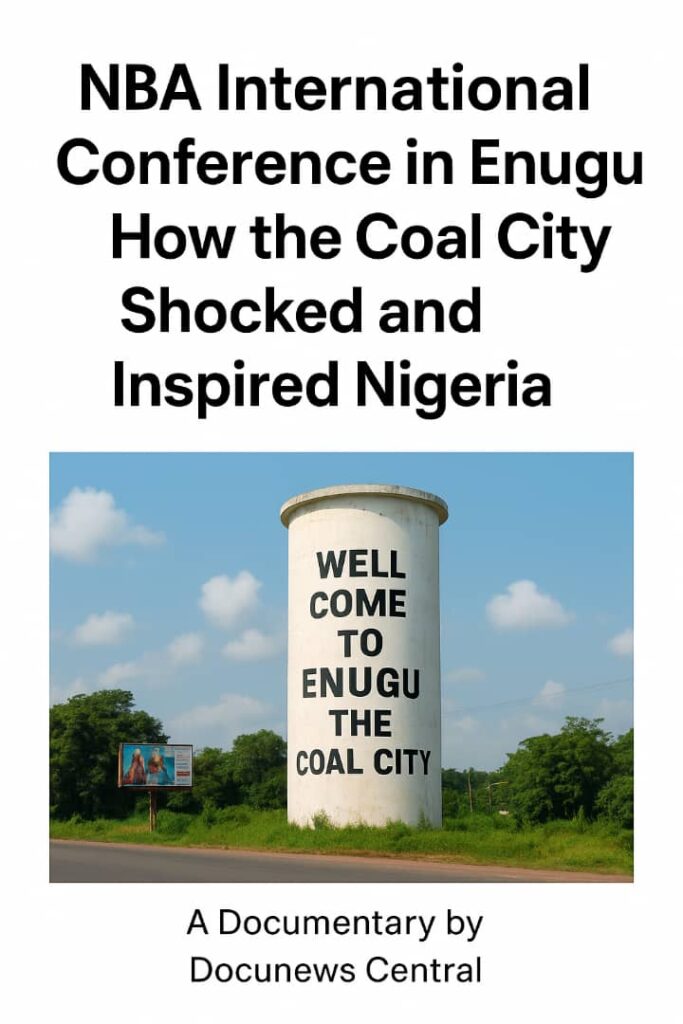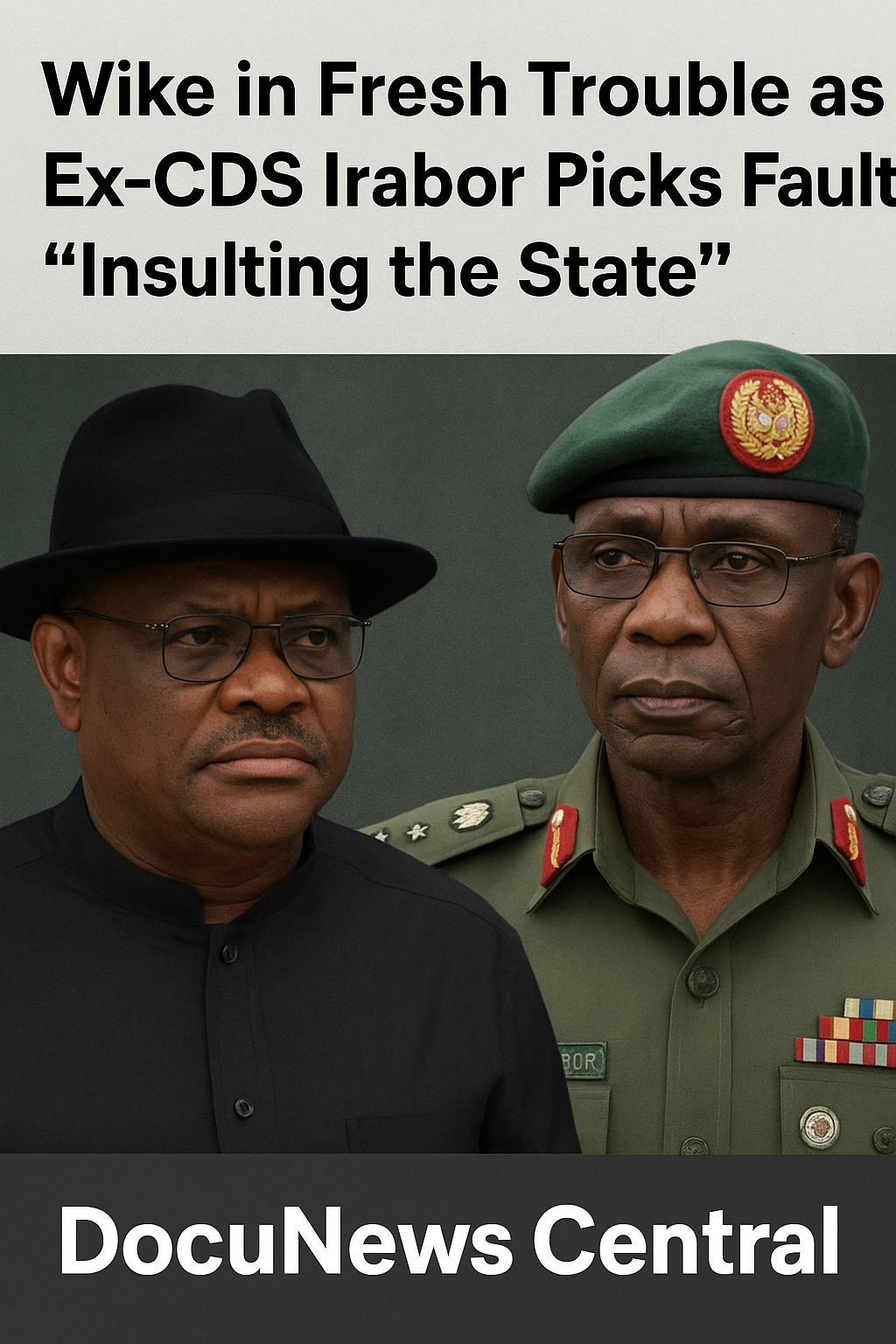
NBA International Conference in Enugu: How the Coal City Shocked and Inspired Nigeria
Subheading: A Docunews Central documentary on perceptions, reality, and the lessons of development from Enugu, host city of the 2025 NBA International Conference.
![Suggested Banner Image: Aerial view of Enugu city with the International Conference Center in focus]
Introduction: A Controversial Choice
When the Nigerian Bar Association (NBA) announced that its 2025 International Conference would be hosted in Enugu, the Coal City State capital, the reaction was swift and skeptical.
Lawyers across the country, especially those in the Southwest and Abuja, grumbled in disbelief.
Why Enugu? Why the East?
In a region often portrayed in the media as volatile, plagued by insecurity, and riddled with separatist tensions, choosing Enugu seemed to many like a gamble. Some whispered that the decision was politically motivated, others feared poor logistics, and more than a few quietly wished the association had chosen the “safer” and “tested” hubs of Lagos or Abuja.
But as August 2025 unfolded, and thousands of legal practitioners trooped into Enugu for one of the largest professional gatherings in Africa, something extraordinary happened.
The city didn’t just rise to the occasion—it shattered stereotypes and won hearts.
This documentary by Docunews Central explores how the 2025 NBA International Conference became a turning point in the way Nigerians see Enugu, what it revealed about development, and the lessons the rest of the country can learn from the Coal City.
Arriving With Doubts, Leaving With Awe
Delegates arriving at Akanu Ibiam International Airport carried mixed emotions. Many were on edge, scanning their surroundings for signs of disorder or insecurity. But instead, what they found was calm orderliness.
Airport services were efficient, the roads into town were smooth, and the first impressions of Enugu’s clean streets set the tone for a conference that would reshape opinions.
Pull Quote: “Indeed, Enugu City disappointed us.” – Olalekan Solomon, Lawyer & Attendee
His disappointment, of course, was not in what was lacking, but in how the city defied every negative expectation.
The Jewel of the East: International Conference Center
At the heart of the NBA gathering was the Enugu International Conference Center (ICC), a facility that surprised even the most well-traveled lawyers.
With its modern design, state-of-the-art sound systems, ample seating, and well-planned halls, the ICC proved to be the kind of venue that could comfortably host not only national but global events.
Pull Quote: “If you blindfolded me and brought me into this hall, I would have sworn I was in Dubai or Cape Town.” – Lawyer from Ibadan
The ICC became the symbol of the entire conference—a living rebuttal to those who doubted the city’s ability to deliver.
![Suggested Image: Exterior shot of Enugu International Conference Center]
Hotels, Resorts, and a Warm Welcome
Beyond the venue, Enugu’s hospitality industry stood tall. Thousands of lawyers found accommodation in the city’s sprawling network of hotels and resorts. From luxury facilities like Nike Lake Resort to mid-range and budget-friendly lodgings, the city offered variety without chaos.
But what impressed visitors most was not just the infrastructure—it was the people.
Enugu residents welcomed delegates warmly, offering directions, assisting with logistics, and making visitors feel at home.
Pull Quote: “I got lost trying to find a restaurant, and two young men not only gave me directions but actually walked me there. That kind of gesture is rare in other big cities.” – Female Lawyer from Osun State
This human warmth became one of the most enduring memories of the conference.
Transportation: Orderly but Expensive
One area that drew mixed reviews was transportation. Delegates acknowledged that Enugu’s transport system was organized, orderly, and relatively safe compared to other Nigerian cities.
However, the costs were notably higher than expected. Still, many visitors felt the efficiency justified the price.
As Solomon remarked in his reflection:
Pull Quote: “Their transportation system is excellent, well-arranged, and orderly—although extortionate. But it shows that Easterners know what they want and are committed to achieving it excellently.”
The Shadow of Stereotypes
Perhaps the most powerful part of the Enugu story was how it dismantled long-held stereotypes.
For years, the Southeast has been in the news for the wrong reasons: sit-at-home orders, violent clashes, political agitations, and claims of underdevelopment.
These narratives shaped national imagination, making many Nigerians assume that cities like Enugu were unsafe, chaotic, or under-equipped.
But the NBA conference forced a national re-examination.
Pull Quote: “If this conference did anything, it was to prove that we don’t always know our own country. Enugu is far ahead of many cities we celebrate.” – Senior Advocate at NBA Closing Gala
Comparisons With Lagos and the Southwest
The comparison was inevitable. Lagos, Nigeria’s economic nerve center, remains in a class of its own. But outside Lagos, many Southwestern states have struggled with urban planning and infrastructure.
Enugu, by contrast, presented itself as a city built with foresight. Its streets were cleaner, its layout more deliberate, and its public infrastructure more reliable than many of its counterparts.
This sparked a quiet but important conversation: if Enugu, with fewer resources, could achieve this level of development, what excuse did other regions have?
Historical Roots of a Planned City
To understand Enugu’s unique character, one must look back at its history.
Founded in 1909 as a coal mining camp, Enugu quickly became a center of economic activity. The British colonial administration recognized its importance and invested in structured urban planning.
Roads were laid out, residential quarters were designed, and administrative offices were built with precision.
This foundation of planning has endured through decades of political upheaval, civil war, and economic transitions. Unlike many Nigerian cities that grew organically without a blueprint, Enugu retained its structured DNA.
The Emotional Aftermath: Enugu Is Missed
When the conference ended, many delegates left reluctantly. Unlike other events where participants are eager to return home, the NBA conference created a sense of longing.
Olalekan Solomon’s final words captured the collective sentiment:
Pull Quote: “Enugu is greatly missed!!!”
That simple line reflected not just admiration for the city’s infrastructure, but an emotional connection forged through hospitality, culture, and orderliness.
Lessons for Nigeria
The NBA International Conference in Enugu was more than a professional gathering—it was a national case study.
Key Lessons:
Perception vs. Reality: Enugu defied negative labels attached to the Southeast.
Planning Matters: Cities built with foresight endure longer.
Infrastructure Defines Reputation: ICC reshaped perceptions overnight.
Hospitality Counts: People matter as much as buildings.
Healthy Competition: Lagos shouldn’t be the only benchmark.
Fast Facts About Enugu
Founded: 1909 as a coal mining settlement
Nickname: The Coal City
Population: Estimated 1.2 million (2025)
Notable Landmark: Enugu International Conference Center (ICC)
Cultural Strength: Hospitality, calm lifestyle, and rich Igbo heritage
Unique Advantage: Structured urban planning inherited from colonial foundations
Voices From Delegates
Senior Advocate of Nigeria (SAN):
“Enugu has shown us that development is not about noise but about quiet, deliberate action.”
Young Lawyer from Abuja:
“I came here expecting insecurity, but I saw peace and order. The media has been unfair to this city.”
Female Lawyer from Osun:
“The hospitality touched me. This city deserves more recognition.”
Lawyer from Ibadan:
“The International Conference Center is on par with the best I’ve seen abroad. This was beyond my imagination.”
Conclusion: A Coal City That Burned Bright
The 2025 NBA International Conference in Enugu began with doubt but ended with pride. Delegates came expecting chaos, insecurity, and mediocrity. They left with admiration, nostalgia, and a renewed respect for the Coal City.
For Enugu, the conference was more than an event—it was a coming of age. For Nigeria, it was a wake-up call.
As Docunews Central reflects on this story, the message is clear: development is possible, stereotypes can be broken, and excellence exists outside the usual power centers.
Enugu did not just host a conference. It hosted a revelation. It reminded the nation that in the heart of the East, there is a city that knows what it wants, commits to it, and delivers it with excellence.
And yes, as many lawyers confessed on their way home: Enugu is already missed.








